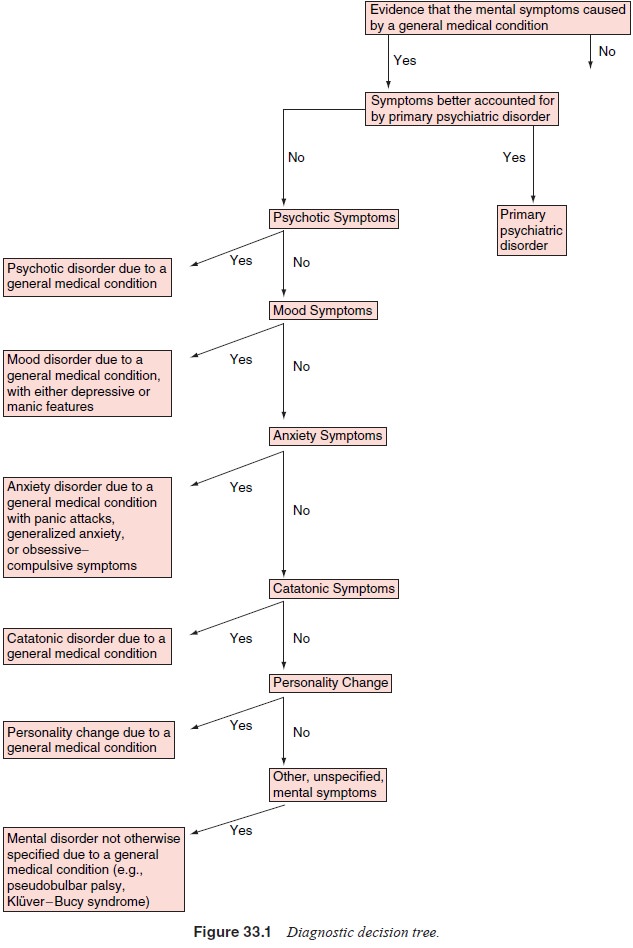Chapter: Essentials of Psychiatry: Mental Disorders Due to a General Medical Condition
Mental Disorders Due to a General Medical Condition
Mental Disorders Due to a General Medical Condition
Introduction
This deals with disorders characterized by mental
symp-toms which occur due to the direct physiological effect of a general
medical condition. In evaluating patients with mental symptoms of any sort, one
of the first questions to ask is whether those symp-toms are occurring as part
of a primary psychiatric disorder or are caused by a general medical condition,
and Figure 33.1 presents a decision tree designed to help in making this decision.
The first step is to review the history, physical examination and laboratory
tests to see if there is evidence for the presence of a general medi-cal
disorder that could plausibly cause the mental symptoms in question. In making
this determination, one looks not only for a temporal correlation (e.g., the
onset of a psychosis shortly after starting or increasing the dose of a
medication), but also keeps in mind well-documented associations between
certain mental symptoms (e.g., depression) and certain general medical
condi-tions (e.g., Cushing’s syndrome). If it appears, at this point, that the
mental symptoms could indeed be occurring secondary to a gen-eral medical
condition, the next step involves determining whether or not these symptoms
could be better accounted for by a primary psychiatric disorder. For example,
consider the case of a 45-year-old man with a history of recurrent major
depression, currently euthymic, who begins a course of steroids for asthma and
then, within a week, becomes depressed. The steroids are stopped but the
depression continues. In this case, if the depression had cleared shortly after
stopping the steroids, one might make the case that the depression occurred
secondary to the steroid treatment; the persistence of the symptoms, however,
argues strongly that this depression represents rather a recurrence of the
major depression.

Once it appears that the mental symptoms in
question could well directly result from a general medical condition and could
not be better accounted for by a primary psychiatric disorder, then it re-mains
to classify these symptoms into one of the specific types noted in Figure 33.1,
and to proceed to the appropriate section below. There is also, at the end of
the decision tree, a residual category for “unspeci-fied” mental symptoms, and
two such syndromes, not uncommonly found in consult-liaison work, are included,
namely pseudobulbar palsy and the Klüver–Bucy syndrome.
In caring for patients with mental disorders due to
a general medical condition, the question arises as to whether or not
symp-tomatic treatment for these mental symptoms should be offered. First, one
must determine whether the mental symptoms demand emergent treatment. Consider,
for example, a postictal psychosis characterized by delusions of persecution
which prompt the patient to become assaultive: here, even though the condition
itself will eventually resolve spontaneously, symptomatic treatment of the
psychosis is required to protect the patient or others. In cases where the mental
symptoms do not present an emergency, one looks to whether the underlying
general medical condition is treatable or not. For example, in the case of
psychosis due to Huntington’s dis-ease, as the underlying condition is not
treatable, one generally proceeds directly to symptomatic treatment. In cases
where the un-derlying condition is treatable, then one must make a judgment as
to whether, with treatment of the underlying general medical con-dition, the
mental symptoms will resolve at a clinically acceptable rate. Consider, for
example, a patient with anxiety due to hyperthy-roidism who has just begun
treatment with an antithyroid drug. In such a case, the decision as to whether
to offer a benzodiazepine as symptomatic treatment for the anxiety depends not only
on the se-verity and tolerability of the anxiety, but also on the expected time
required for the antithyroid drug to resolve the hyperthyroidism: here,
clearly, considerable clinical judgment is required.
Related Topics